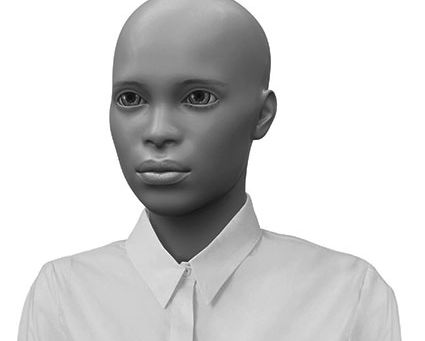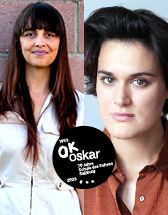Shu Lea Cheang, Sarah Ciston, Ariana Dongus, Magda Tyzlik-Carver and Matteo Pasquinelli
Machines of Seeing: AI between Cultural Critique and Artistic Appropriation
19. 8. 23, 2 p.m. – 6 p.m.
Machines of Seeing: AI between Cultural Critique and Artistic Appropriation
Seventy years after founding the "School of Vision", the symposium asks how machine vision affects our sense of sight. The expansion of human creativity, support of perception, and production of new images, texts and sounds: artificial intelligence is currently being discussed socially with its possibilities and shortcomings. In the process, a fear of taking over human abilities and tasks is very present and associated with this is a one-sided pejorative portrayal of techno-political contexts. Suppose AI is seen as a possible tool in a world riddled with crises. In that case, new connections between technology and critical materialism emerge that also question seeing and, thus, possible world views. The symposium investigates creative and exploratory processes from the artistic perspective: How do we capture the technological co-evolution of perception and creativity? What concept of art do these developments bring forth?
With Shu Lea Cheang (artist, Taiwan/France), Sarah Ciston (Mellon PhD Fellow Media Arts and Practice, University of Southern California and artist, US), Ariana Dongus (media scientist and AI researcher, Germany), Magda Tyzlik-Carver (Associate Professor of Digital Communication and Culture, Aarhus University, Denmark) and Matteo Pasquinelli (Professor of Media Philosophy at Karlsruhe University of Art and Design).
Programme
2 pm Welcome
Sophie Goltz (Director, Summer Academy Salzburg) and Maximilian Lehner (Assoc Curator, Summer Academy Salzburg)
2:30 pm Biases in Artificial Intelligence
Sarah Ciston (Mellon PhD Fellow Media Arts and Practice, University of Southern California, artist, USA) and Ariana Dongus (media scientist, researcher, Germany)
3:30 pm Future of artificial intelligence and data
Shu Lea Cheang (artist, Taiwan/France) in a talk with Magda Tyzlik-Carver (Assoc Prof Digital Communication and Culture, Aarhus University, Denmark)
4:30 pm Pause
5 pm What Kind of Intelligence is Artificial Intelligence? Towards a Sociogenic Theory of Automation
Matteo Pasquinelli (Prof Media Theory, Karlsruhe University of Arts and Design, Germany)
key data
- Venue
- Stadtgalerie Zwergelgarten
- Date
- 19. 8. 23, 2 p.m. – 6 p.m.
Shu Lea Cheang
Shu Lea Cheang “My work aims to re-envision genders, genres, and operating structures. My genre‑bending, gender‑hacking practices challenge the existing operating mechanisms and society’s structural boundaries. I build social interface with transgressive plots and open network that permits public participation; I construct networked installation and multi-player performance in participatory impromptu mode; I draft sci-fi narratives in film scenario and artwork imagination. I seek to define a genre of new queer sci-fi cinema.”
Education including teaching experience
1979 Master of Arts, Cinema Studies, New York University
1976 Bachelor of Arts, History, National Taiwan University
Teaching
2003-2004 Networked performance, Zürcher Hochschule der Künste, Zurich (CH)
2002 HUMANMATERIALMACHINEFACTOR, Dasarts, Amsterdam
Website
Exhibitions
Group exhibition
2023 Sade Freedon or Evil, CCCB, Barcelona (ES)
2023 Matter of Flux, Art Laboratory Berlin, Berlin
2022 Reproduction Otherwise, MU Hybrid Art House, Eindhoven (NL)
2022 Kingdom of the Ill TECHNO HUMANITIES, MUSEION, Bolzano (IT)
2022 FUTURE BODIES FROM A RECENT PAST, Museum Brandhorst, Munich (DE)
2022 A Portal to the Next, Ulsan Art Museum, Ulsan, South Korea
2021 Witch Hunt, Hammer Museum, Los Angeles, CA (US)
Publications
Recent publications/reviews
Pleasure by Extraction Shu Lea Cheang at the musee departemental des arts asiatiques review by Fracesco Tenaglia, published at Art in America, 2021
Viral Love, Shu Lea Cheang portrait by Banyi Hwang, Spike Art, 2021
Dissident Interfaces, Shu Lea Cheang’s 3x3x6 and the Digital Avant-Garde, Paul B.Preciado, 3x3x6 catalogue, 2019
Society Has Become the Biggest Panopticon, Zach Blas/Frieze, 2019
The Digiarchitextual Body – or: Brandon’s Corporeal Virtualities, Jeppe Ugelvig, Parallax 91, Routledge, 2019

Sarah Ciston
Sarah Ciston (they/them) builds critical–creative tools to bring Intersectional approaches to machine learning. Recently named AI Newcomer by the German Informatics Society, they are an AI Anarchies Fellow with the Akademie der Künste, a Mellon Fellow in Media Arts and Practice at the University of Southern California, and an Associated Researcher at the Humboldt Institute for Internet and Society, plus author of A Critical Field Guide to Working with Machine Learning Datasets from the Knowing Machines research project. Sarah’s projects include an interactive NLP database to "rewrite" the inner critic and a bot that tries to explain feminism to online misogynists. They lead Creative Code Collective, a student community for co-learning programming using approachable, interdisciplinary strategies.
Magdalena Tyżlik-Carver
Magdalena Tyżlik-Carver is curator, researcher and theorist who engages the concept of posthuman curating to inquire into how computational culture and data impact daily practices of living. Her current research in the projects Fermenting Data and Curating Data focus on developing participatory methods for data practices beyond BigTech extractivism and expansive infrastructural politics, while also looking at the ways in which knowledge practices and systems are co-developed. In her teaching and research she draws on trans*feminist values and approaches to address who has access to technology and data and on what conditions. Her recent curatorial projects include exhibitions Fermenting Data: Aarhus 8000-8220 (2021) and Screenshots: Desire and Automated Image (2019). Magdalena is an Associate Professor of Digital Communication and Culture in the Dept. of Digital Design and Information Studies at Aarhus University and Associate Researcher in the Centre for the Study of the Network Image in London South Bank University.
Matteo Pasquinelli
Matteo Pasquinelli is Professor of Media Philosophy at the University of Arts and Design Karlsruhe. He is the author of The Eye of the Master: A Social History of Artificial Intelligence (Verso Books, 2023). He is also the recipient of the ERC Consolidator Grant AIMODELS.
